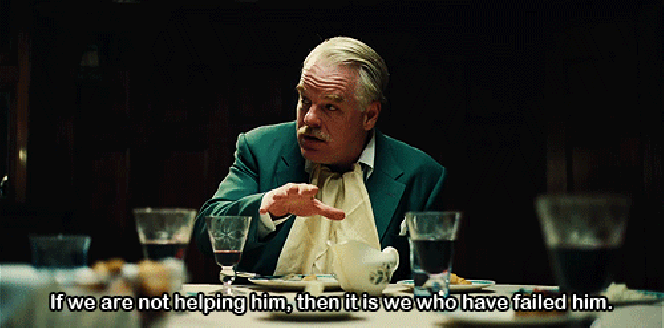“And That’s My Life” — Philip Seymour Hoffman — Why Addicts Need Mental Health Help Too

You try to be artful for the film, but it’s hard. I’d finish a scene, walk right off the set, go in the bathroom, close the door and just take some breaths to regain my composure. In the end, I’m grateful to feel something so deeply, and I’m also grateful that it’s over.” He smiled. “And that’s my life.”
After 46 years of life, amazing performances on screen and on stage, and a deep love for his mother and family, Hoffman can finally be grateful that it’s over.
Drug addiction was something that he struggled with from a very young age, saying that he went into rehab for the first time when he was 22, when he “got panicked for his life.” He battled with his addiction every day, and in the end it claimed him.
Notice the words I used there? “Struggled”, and “battled”. Those are very noble words. They are strong, and well meaning. They indicate that he was trying, that he was pushing back against the vortex that is an addiction. He is privileged that we don’t degrade him for the problem that he faced in life, and we don’t tarnish his memory because of that problem in death. Not everyone is so lucky.
For many with addictions, to drugs, alcohol, gambling, porn, food, cutting or anything else you could imagine, there is not a lot of sympathy given. There is only blame.
“Why can’t you just stop?”
People with addictions want to stop. People with addictions can’t stop.
That is the nature of addiction. It’s an intense pull that cannot be ignored, a tantalizing trip that entices you again and again. Addiction is an imbalance, and it is a mental illness. People struggling with addiction need help, because many of them are acutely aware, and ashamed of the fact that they can’t stop. They are ashamed of themselves and shamed by a society that demands that perfection be attained on your own, achieved with willpower, when willpower is something that alone cannot overcome addiction. Addiction needs a team effort.
Craig Ferguson has a very heartfelt monologue that talks about addiction, and that with the help of friends and family, he now faces a lifetime of vigilance.
For the last week, so many of you have been reading my blog and praising my openness in talking about mental illness and my struggles with suicidal thoughts and my bipolar II disorder. So many of you shared stories and sent me messages, and I tried to get to all of them. I felt so loved and supported, and I hope that through my blog you were able to feel some your own love and support.
If you’re struggling, fighting, battling with addiction, know that you shouldn’t feel ashamed. Just feel that you need help, and that it’s okay to ask for help too. Addiction can be a sign or symptom of an underlying mental illness, and is also an illness on it’s own.
There is no shame in getting help.
Talking about battling addiction and getting help is something that should be praised.
(As a tiny footnote I would also like to say that I have been a Seahawks fan since I was 12 years old and it’s amazing to finally see them win a Superbowl.)